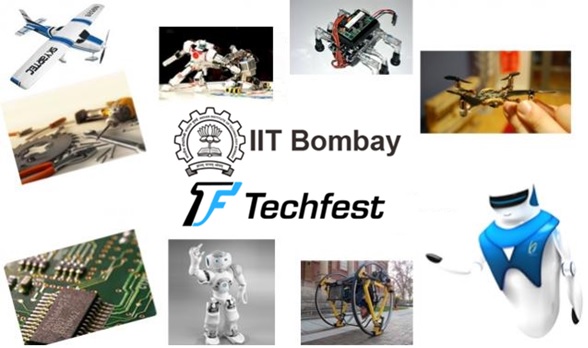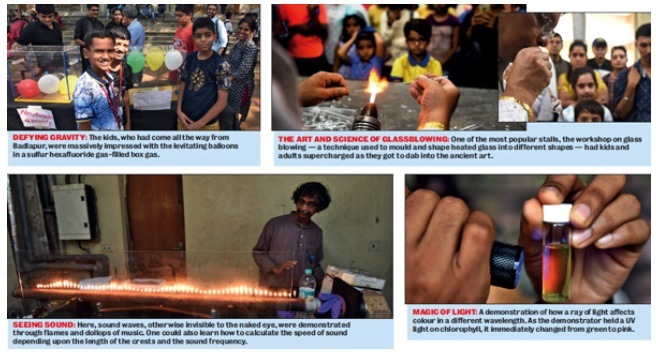
Science workshops for kids are a great way of enhancing your kids understanding of science through fun, practical experiences. Many science workshops are conducted during Holidays and is a creative use of time during the holidays.
Several engaging science workshops are held in Mumbai that designed to make science learning fun and interactive for children.
GET INSTANT HELP FROM EXPERTS!
- Looking for any kind of help on your academic work (essay, assignment, project)?
- Want us to review, proofread or tidy up your work?
- Want a helping hand so that you can focus on the more important tasks?
Hire us as project guide/assistant. Contact us for more information
These workshops are conducted on interesting science topics including Robotics, 3D modelling and printing, Kitchen Chemistry, Astronomy, Science experiments with household items, and so on.
Useful Links
Science Workshops at Nehru science Centre
Top Science Exhibitions in Mumbai
These science fairs offer a healthy mix of activities, workshops, lab visits and lectures on all things science – a clean break from the mundane run-of-the- mill activities available to families, giving kids a chance to have fun alongside learning.
“All Outstanding work in the field of science is the result of immense zeal applied to a great idea.”
Techfest (IIT-B): Technology Festival Conducted by Indian Institute of Technology
Techfest is a popular technology festival conducted by Indian Institute of Technology, Bombay (IIT-B). Techfest, among Asia’s largest technology related festivals, hosts various exhibitions, workshops and competitions, and is also a great platform to interact with well known personalities.
An interesting aspect of ‘Techfest’ is the competition where students come up with innovative ideas and solutions based on the ‘topic’ of the competition.
Website: techfest.org
Technovanza, (VJTI, Matunga)
Technovanza is a techno-management festival organized every year by the prestigious Veermata Jijabai Technological Institute (VJTI) in Matunga. The idea is to expose the participants not only to technology, but also economics, politics and art.
Robotics contest pays tribute to dabbawalas
At one of Technovanza exhibitions, competing students had to help their robots navigate a circuit similar to the one traversed by the Mumbai’s dabbawalas to deliver tiffin boxes from homes to offices in the city.
Website: Technovanza.org
Tata Institute of Fundamental Research (TIFR) Annual Science Fair

Every year, on February 28th (National Science Day), TIFR, the Tata Institute of Fundamental Research brings you a day-long celebration of science at TIFR’s Colaba campus interesting lectures, open air science demos, lots of hands-on experiments, and of course, a chance to visit their laboratories!
We recommend lab visits for adults and children aged above 12 years (8th standard and above). The outdoor activities are suitable for children of all ages. Children less than 16 years of age MUST be accompanied by a responsible adult.
GET INSTANT HELP FROM EXPERTS!
- Looking for any kind of help on your academic work (essay, assignment, project)?
- Want us to review, proofread or tidy up your work?
- Want a helping hand so that you can focus on the more important tasks?
Hire us as project guide/assistant. Contact us for more information
(𝗟𝗮𝗯 𝘃𝗶𝘀𝗶𝘁𝘀 𝗮𝗿𝗲 𝗯𝘆 𝗽𝗿𝗲-𝗿𝗲𝗴𝗶𝘀𝘁𝗿𝗮𝘁𝗶𝗼𝗻 𝗼𝗻𝗹𝘆. Those visiting the labs are naturally also welcome to attend the outdoor activities and lectures)
Venue: TIFR Colaba Campus, Homi Bhabha Road, Navy Nagar Mumbai
Highlights of earlier years:
- Playing with smoke: The experiments with liquid nitrogen on the TIFR campus was one of the biggest crowd puller at the fair. As a lab technician poured liquid nitrogen on the floor to convey how unstable and cold the gas is, it drew lots of ‘oohs’ and ‘aahs’ from budding scientists who watched in awe.
- Fun with Biology: Slides of a fruit fly, live embryo of zebrafish among others had many young scientists peering excitedly through a microscope to understand their anatomical features.
- The Mighty Scope: A star attraction, the electron microscope stood proudly as visitors were explained about its impressive ability to magnify images without the use of light.
- Defying Gravity: Kids were massively impressed with the levitating balloons in a sulfur hexafluoride gas-filled box gas.
- The art and science of glassblowing: One of the most popular stalls, the workshop on glass blowing – a technique used to mould and shape heated glass into different shapes – had kids and adults supercharged as they got to dab into the ancient art.
- Seeing Sound: Sound waves, otherwise invisible to the naked eye, were demonstrated through flames and dollops of music. One could also learn how to calculate the speed of sound depending upon the length of the crests and the sound frequency.
- Magic of light: A demonstration of how a ray of light affects colour in a different wavelength. As the demonstrator held a UV light on chlorophyll, it immediately changed from green to pink.
Science Exhibitions in Schools
School science exhibitions provide a fantastic opportunity for students to showcase their scientific knowledge and skills by creating innovative projects and experiments. Students can participate in these exhibitions by creating projects that explore cutting-edge scientific research and showcase their understanding of the latest technological advancements.
School science exhibitions feature a wide range of exhibits highlighting the latest scientific and technological developments. From cutting-edge technological era to renewable energy and sustainable living. The aim of such events is to provide a platform for students to demonstrate the construction of knowledge by connecting new ideas to existing concepts.
Highlights of such science exhibitions:
- Models and Scientific Drawing to be prepared by the students (with helps from their parents)
- Models must be presented collaboratively by the students
- Students must be prepared to answer judges’ questions about the content and development of their projects.
- Include projects, artwork, science quiz competition, JAM (Just a Minute) elocution competition
Topics for Science Projects & Experiments
Theme: Technology and Toys
Remote-controlled drones
Investigate the science behind remote-controlled drones and how they are used in various fields, such as photography, delivery, and search and rescue. The project could involve researching the different types of drones, building and testing a mini drone, and discussing the safety and ethical considerations of drone use.
Virtual Reality (VR)
Explore the science behind virtual reality (VR) and how it can be used to simulate experiences that challenge conventional thinking. The project could involve researching the technology behind VR, creating a VR experience that educates users on a particular topic, and discussing the potential of VR to revolutionize various fields, such as education and entertainment.
Rubik’s Cube
Explore the science behind the Rubik’s Cube and how it challenges conventional thinking about puzzles. The project could involve researching the history and design of the Rubik’s Cube, conducting experiments to test different solving methods, and creating a new, innovative twist on the classic puzzle.
Yo-Yo
Investigate the science behind the mechanics of a yo-yo and how it challenges conventional thinking about gravity and motion. The project could involve researching the physics behind yo-yos, designing and building a yo-yo, and experimenting with different tricks and techniques to showcase the science behind the toy.
Theme: Sustainable City
Green Roofs
Investigate the science behind green roofs and how they can help reduce the urban heat island effect and mitigate the negative impacts of urbanization. The project could involve researching the benefits of green roofs, designing and building a miniature green roof, and measuring its effects on temperature and air quality.
Vertical Farming
Explore the science behind vertical farming and how it can challenge conventional thinking about agriculture. The project could involve researching the benefits and challenges of vertical farming, designing and building a miniature vertical farm, and testing different variables such as lighting and nutrient levels to optimize plant growth.
Vertical Gardening
Vertical gardening is a concept similar to vertical farming but with a focus on growing plants for personal use in small spaces, such as balconies, patios, or indoor areas. Vertical gardening involves growing plants on vertical structures like walls or trellises, using a variety of techniques such as hydroponics, aeroponics, or soil-based methods.
Vertical gardening can be a sustainable solution for people who live in urban areas with limited space for traditional gardening. It can also help to reduce the urban heat island effect, improve air quality, and increase biodiversity in cities.
A project on vertical gardening could involve researching the benefits and challenges of vertical gardening, designing and building a vertical garden structure, selecting and growing plants suitable for vertical gardening, and monitoring the growth and yield of the plants over time.
Renewable Energy
Explore the science behind renewable energy and how it can be harnessed to power cities sustainably. The project could involve researching the different types of renewable energy sources, designing and building a small-scale renewable energy system, and discussing the challenges and opportunities of implementing renewable energy in urban areas.
Water Conservation
Investigate the science behind water conservation and how it can be implemented in cities to reduce water waste and increase efficiency. The project could involve researching the different water-saving technologies and practices, designing and building a model of a sustainable water system, and measuring the water usage and savings of the system.
Theme: Chemistry for Human Advancement
Natural Medicines
Investigate the chemistry behind natural medicines and how they can be used for human health. The project could involve researching the chemical compounds found in various medicinal plants, extracting these compounds and testing their effectiveness against common illnesses, and comparing the results to conventional pharmaceuticals.
Food Preservation
Explore the chemistry behind food preservation and how it has allowed for the development of long-distance food transportation and storage. The project could involve researching the different methods of food preservation, experimenting with different preservation techniques, and discussing the impact of food preservation on food security and the global food system.
Alternative Sources of Energy
Investigate the chemistry behind alternative sources of energy, such as fuel cells or hydrogen-powered vehicles. The project could involve researching the chemical processes behind these technologies, designing and building a model of a fuel cell or hydrogen-powered vehicle, and discussing the potential of these technologies to replace fossil fuels and mitigate climate change.
Theme: Scientific odyssey of life
CRISPR gene editing
Investigate the science behind CRISPR gene editing and its potential to revolutionize medical treatments. The project could involve researching the history of gene editing, exploring the scientific concepts behind CRISPR, and discussing the ethical implications of gene editing.
More Topics
From Sleight of Hand to Great Illusion. Magic of science: Kitchen Experiments. Experiments with natural elements (Air, Water, Light and sound). Machines everywhere.
Innovations that challenge conventional wisdom: Technology and Toys. Chemistry for human advancement. Scientific odyssey of life. Sustainable City.
More Topics: 1. Living and Non-Living Things 2. Water 3. Plants 4. Life cycles 5. Experiments with colour paddles 6. Body Systems 7. Materials and their properties 8. Healthy Food V/s Junk Food 9. Light and Sound 10. Animal and their habitats 11. Simple Machines 12. Fun with Forces(Magnets/Gravity) 13. Space Science 14. 5 Senses
Artwork by students based on the topics :- Water, Solar System or Life Cycles
Science Quiz Competition :
JAM: Just a Minute Elocution competition
Topics :If I become an Astronaut. Water cycle . How I become a butterfly ? ( Life cycle of a butterfly ) . My travel to planet . How day and night occurs?
GET INSTANT HELP FROM EXPERTS!
- Looking for any kind of help on your academic work (essay, assignment, project)?
- Want us to review, proofread or tidy up your work?
- Want a helping hand so that you can focus on the more important tasks?
StudyMumbai.com is an educational resource for students, parents, and teachers, with special focus on Mumbai. Our staff includes educators with several years of experience. Our mission is to simplify learning and to provide free education. Read more about us.

Leave a Reply
You must be logged in to post a comment.